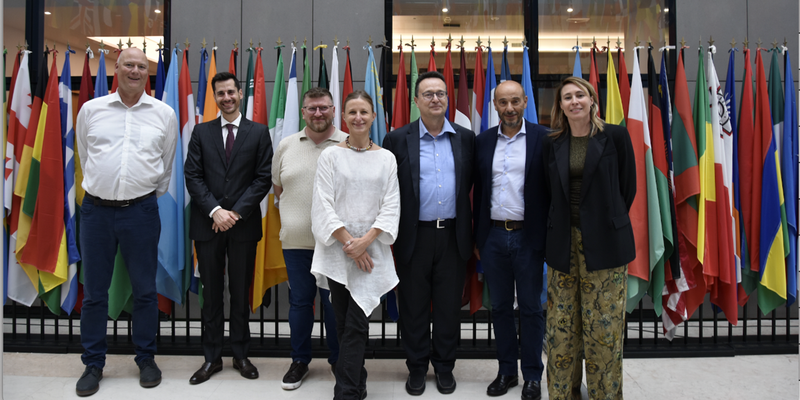IPPC Secretariat and EFSA Strengthen Collaboration on Global Plant Health
Posted on Wed, 16 Oct 2024, 12:40

©FAO
Rome, 16 October 2024 — In a significant step towards bolstering international cooperation in plant health, the International Plant Protection Convention (IPPC) Secretariat and the European Food Safety Authority (EFSA) convened a bilateral meeting at the Food and Agriculture Organization (FAO) Headquarters in Rome, on 3 October 2024. The meeting was attended by key representatives from both organizations, led by Sarah Brunel, the Implementation and Facilitation Unit (IFU) Lead, IPPC Secretariat, and EFSA focal point for the IPPC Secretariat, Giuseppe Stancanelli and Sybren Vos, leading the two Plant Health teams in the Environment, Plants & Ecotoxicology (PLANTS) Unit at EFSA.
The discussions underscored the shared mission of IPPC community and EFSA to protect plant health, prevent the spread of plant pests and diseases, and safeguard global phytosanitary standards in the wider context of One Health.
Aligning priorities for protecting plant health
Throughout the day, key priority topics of common interest were explored, starting with EFSA’s horizon scanning for emerging risks and surveillance strategies, with EFSA sharing advanced techniques for tracking plant health threats, while the IPPC Secretariat focused on improving inspection protocols, particularly for sea containers, a key factor in global pest movement. EFSA showed the Plant Health Newsletter on Horizon Scanning and the PeMoScoring tool for ranking risks from emerging pests, as well as the upcoming community on plant health on the Epidemic Intelligence from Open Sources (EIOS) platform.
The IPPC Secretariat presented the Pest Outbreak Alert and Response Systems (POARS), a global pest alert system with mechanisms to evaluate and communicate emerging pest risks, providing regular information to national plant protection organizations (NPPOs) on changes in pest status around the world. NPPOs can use this to quickly adapt their phytosanitary systems to reduce the risk of introduction and spread.
The IPPC’s Phytosanitary Capacity Evaluation (PCE) tool, which supports countries in enhancing national plant health systems by addressing capacity development opportunities was presented. EFSA’s Plant Risk Assessment (PRA) activities were discussed, focusing on rapid pest risk assessments for traded commodities—essential for informed decision-making in plant protection at EU level.
Antimicrobial resistance (AMR), a growing cross-sectoral challenge to One Health, was a major focus of discussion. The IPPC Secretariat presented the ongoing IPPC Observatory Survey on the use of antimicrobial and fungicide products in plant health, which will culminate in the IPPC Observatory Study on AMR. This study aims to establish valuable global data on AMR in the phytosanitary context, based on primary data gathered from the IPPC contracting parties. The results of a study funded by EFSA on data collection on antibiotics use and resistance in the control of plant pathogenic bacteria were presented. EFSA assesses the risk of antimicrobial resistance in the EU food chain. EFSA’s ongoing work on assessment of alternative methods for control of plant pests was also presented.
Ciro Gardi, on behalf of the EFSA delegation, also joined the FAO Headquarters the following day to attend the 29th Session of the Committee on Agriculture side session “Plant health: Why is it crucial for the success of One Health?”.
Strengthening Future Collaboration
The meeting concluded with a series of collaborative commitments that emphasize ongoing knowledge exchange and capacity-building. Future IPPC Secretariat participation in EFSA’s webinar on the dashboard for Horizon Scanning was agreed as well as joining the Plant Health community of EIOS led by EFSA and the second international workshop on horizon scanning. Strengthening collaborative efforts on capacity development was an area both organizations were very enthusiastic about, including identifying synergies and peer-review opportunities on both IPPC and EFSA e-learning courses and training materials with EFSA evaluating incorporating IPPC’s surveillance e-learning course into future educational resources. Both organizations agreed to explore co-organizing future webinars and workshops, such as on Pest Risk Analysis, Commodity Risk Assessment, evaluation of climate suitability for plant pests and alternatives to antimicrobials in crop protection.
As emphasized by Sybren Vos in his concluding remarks "This meeting marks a pivotal step in enhancing our collaboration with the IPPC Secretariat, aligning our strengths to address plant health challenges through innovation, collaboration, and shared learning. We look forward to realizing the tangible outcomes of today’s discussions."

